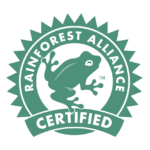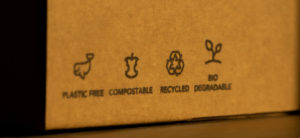Greenwashing: making an unsustainable business look more environmentally friendly, without actually making any meaningful changes that would cut pollution and emissions.

Greenwashing is a misleading marketing tactic that tries to attract eco-conscious buyers.
Unfortunately many companies engage in Greenwashing, because there’s very little government oversight when it comes to making claims about eco-friendly practices. Terms like “eco-friendly,” “sustainable,” “ethical,” and “natural” don’t actually have a clear legal definition, so many marketers will bend and stretch those terms to improve brand image without changing their business operations.
But why?
 Because the public genuinely cares about the environment! There’s a powerful desire among the public to combat global warming and ecological damage. And marketers are very good at tapping into that emotion to sell their products.
Because the public genuinely cares about the environment! There’s a powerful desire among the public to combat global warming and ecological damage. And marketers are very good at tapping into that emotion to sell their products.
A Forbes study found that 88% of people want businesses to help them make a difference in the world. Recent consumer research shows that 70% of Gen Z and 73% of Millenials care about buying from ethical companies. People are simply willing to spend more on sustainable brands.
Bottom line: Being green pays.

But Greenwashing isn’t just an underhanded practice some businesses use to attract more customers. It undermines all environmentally ethical businesses by making the public skeptical of any eco-friendly claims. Greenwashing makes it harder for truly sustainable businesses to be seen and valued for the difference they make in the world.
And Greenwashing can backfire. If a business makes insubstantial environmental claims, they often risk losing the public trust and brand authority they’ve built.
And with Millennials and Gen Z gaining more purchasing power, it is vital for businesses to align their profits with the planet as soon as possible. Otherwise, public sentiment will eventually turn against them.
How can your business avoid Greenwashing?
- Assess company culture. Especially from the decision makers at the top. Make sure your team understands the importance of going green, both for the planet and for your bottom line.

 Go for certified standards. There are 3rd party certifications that allow consumers to trust in your green claims. They cost, but they can often attract more business.
Go for certified standards. There are 3rd party certifications that allow consumers to trust in your green claims. They cost, but they can often attract more business.- Be transparent. Consider releasing an ecological impact report alongside your financial reports.
 Make it easy to check your claims. If you make a claim, explain it where your consumers can easily find the info, either on your website or on the packaging itself.
Make it easy to check your claims. If you make a claim, explain it where your consumers can easily find the info, either on your website or on the packaging itself.
- Don’t make empty claims. Ever seen a coffee shop advertising “gluten-free coffee”? Yeah, don’t be like that coffee shop. Only advertise accomplishments that make a meaningful change.
- Use green packaging. Packaging waste is such a huge problem, and it’s the first impression your product makes on many consumers. It’s essentially the trash your product comes in, and many consumers want to reduce their waste.

- Spend more on being green than on advertising that you are green. One of the easiest ways to spot Greenwashing is when a company spends more on advertising their green credentials than they actually spend on aligning with the environment.
 Follow the industry leaders. There are probably several companies in your industry that are already truly sustainable, and there are more and more each day. Follow their lead.
Follow the industry leaders. There are probably several companies in your industry that are already truly sustainable, and there are more and more each day. Follow their lead.- Go Carbon Neutral. After you’ve cut your emissions as much as possible, purchase carbon offsets to bring your business’s emissions balance sheet to zero.

Be Extraordinary
We applaud any business that meets the environmental standards in their industry. But we like to challenge our partners to push the envelope and find new and creative ways to cut emissions and pollution from their business practices. We’d love to see your business become a sustainability leader in your industry.
We are always happy to help any business or individual reduce or offset their emissions, so partner with us today to find out how your business can truly go green!
